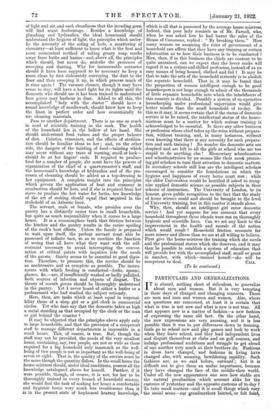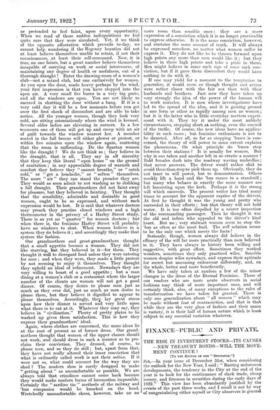PARTICULARS AND GENERALIZATIONS.
IT is absurd, nothing short of ridiculous, to generalize about men and women. But it is very tempting in these days of changed and changing manners. There are men and men and women and women. Also, where sex questions are concerned, at least it is certain that what is true is not new and what is new is not true. All that appears new is a matter of fashion—a new fashion of expressing the same old fact. On the other hand, the new expressions are very amusing, and it is less possible than it was to put differences down to training. Girls go to school now and play games and look to work when they leave school, and they lead independent lives and disport themselves at clubs and on golf courses, and indulge professional ambitions and struggle to get ahead of one another very much as their brothers do. Fashions in dress have changed, and fashions in living have changed also, with amazing, bewildering rapidity. Such fashions are, as we said before, outward ; but it is difficult not to give them an undue importance, because they have changed the face of the middle-class world. Under all the new appearances one sees how stable are the natural peculiarities which account alike for the customs of yesterday and the opposite customs of to-day ? To take small matters—and it is small things which vary the social scene—our grandmothers fainted, or felt. faint, or pretended to feel faint, upon every opportunity. . When we read of these sudden indispositions we feel quite sure that they were simulated. Yet, if we think of the opposite affectation which prevails to-day, we cannot help wondering if the Regency beauties did not at least believe themselves unable to retain, if not their consciousness, at least their self-command. Now, it is true, no one faints, but a great number believe themselves incapable of carrying on work or social intercourse, of maintaining any degree of health or usefulness, out of a thorough draught ! Enter the drawing-room of a women's club—not a mixed club, but one exclusively for women. As you open the door, made heavy perhaps by the wind, your first impression is that you have stepped into the open air. A very small fire bums in a very big grate, and all the windows are open. You are not likely to succeed in shutting the door without a bang. If it is a very cold day it will be a few moments before you get over the first shock of discomfort and are able to take notice. All the younger women, though they look very cold, are sitting ostentatiously where the wind is keenest. Several older ladies are shivering in corners. In a few moments one of them will get up and creep with an air of guilt towards the window nearest her. A member seated in the full breeze will either glower or protest, or within five minutes open the window again, muttering that the room is suffocating. Do the Spartan women like the draught ? We do not think so ; they believe in the draught, that is all. They say in all sincerity that they keep this literal " open house " on the ground of sanitation ; in any appreciable degree of warmth and comfort they believe they " cannot breathe," or " catch cold," or " get a headache," or " soften " themselves. The more " air " they can stand the prouder they are. They would as soon admit to not washing as to disliking a full draught. Their grandmothers did not faint away for pleasure, but they believed in fainting. They thought that the sensibility, admirable and desirable in good women, ought to be so expressed, and without such expression would be lost. It is said that whatever doctors may preach they practise closed windows and a high thermometer in the privacy of a Harley Street study. There is as yet no " quarter " for women doctors ; but when there is, the feminine Harley Street will probably have no windows to shut. When women believe in a system they do believe it ; and accordingly they make that system the fashion. Our grandmothers and great-grandmothers thought that a small appetite became a woman. They did not like starving, but they believed in it—for them. They thought it well to disregard food unless they were catering for men ; and when they were, they made a little protest by not seeming to enjoy it themselves. They thought they upheld an ideal of refinement. Nowadays they are very willing to boast of a good appetite ; but a man dining at a women's club or a restaurant where the larger number of the clients are women will not get a good dinner. Of course, they desire to please men just as much as they ever did, just as much as men desire to please them, but they believe it dignified to appear to please themselves. Accordingly, they lay great stress upon how their dinner is served and very little upon what there is to eat at it. Whatever they may say, they believe in " civilization." Plenty of pretty plates to be washed up gives them satisfaction. This is how they express their grandmothers' ideal. Again, where clothes are concerned, the same ideas he at the root of present as of former dress. Our grand- mothers thought that women of the upper classes should not work, and should dress in such a manner as to pro- claim their conviction. They dressed, of course, to please men, and so they do still ; but, apart from that, they have not really altered their inner conviction that what is ordinarily called work is not their metier. If it were not so, what could account for the way they are shod ? The modern shoe is surely designed to make " getting about " as uncomfortable as possible. We are always told that crinolines cannot come back because they would make modern forms of locomotion impossible. Certainly the " sardine tin " methods of the railway and 'bus companies would be knocked on the head. Wretchedly uncomfortable shoes, however, take up no more room than sensible ones : they are a mere expression of a conviction which it is no longer practicable to express otherwise. It is the same conviction, however, and contains the same amount of truth. It will always be expressed somehow, no matter what women suffer to express it. They do not like to be thrown forward upon high points any more than men would like it ; but they believe m those high points and take a pride in them. Men might believe in some such sign of sonic such con- viction, but if it gave them discomfort they would have nothing to do with it.
If one may yield for a moment to the temptation to generalize, it would seem as though thought and action were rather closer with the fair sex than with tlieir husbands and brothers. Just now they have taken up very strongly the idea of the power of the human will to work miracles. It is men whose investigations have led to the spread of the idea, and it is gaining ground in one form or other as rapidly among men as women ; but it is the latter who in little everyday matters experi- ment with it. They try it under the most unlikely circumstances, stopping short at nothing, even the control of the traffic. Of course, the new ideas have no applica- bility in such cases ; but feminine enthusiasm is not to be daunted. After all, so far as stopping 'buses is con- cerned, the theory of will power to some extent explains the phenomena. On what principle do 'buses atop between their stations ? It is usually for women. But why is one taken and another left in so erratic a manner ? Bold females dash into the roadway waving umbrellas ; that never answers. The driver would rather skid to avoid them than stop to pick them up. Obviously, they do not trust to will power, but to demonstration. Others meekly lift a hand and the 'bus comes to a standstill ; but many who behave in exactly the same manner are left lamenting upon the kerb. Perhaps it is the strong will which succeeds. The present writer has tried many times to account for the apparent caprice of the drivers. At first he thought it was the young and pretty who succeeded in their efforts ; but that theory will not hold water. It is too often dispelled by a nearer inspection of the commanding passenger.. Then he thought it was the old and infirm who appealed to the driver's kind heart. But no ; very stalwart women seem to stop the 'bus as often as the most frail. The will solution seems to be the only one which meets the facts !
Seriously, though, women always did believe in the efficacy of the will far more practically than men believed in it. They have always in history been willing and suggestive, with great effect. Sometimes they worked wonders, sometimes they only practised wiles. Sensible women despise wiles nowadays, and express their aptitude for secret but unceasing endeavour differently, and, on the whole, better and more beneficently.
We have only taken at random a few of the minor changes in the dress of the Eternal Feminine. Those of our readers who are more acute observers in social fashions may think of more important ones, and will certainly think, also, of many exceptions to the rules of transformation we have taken for granted. There is only one generalization about " all women " which may be made without fear of contradiction, and that is that while they are the very glass of fashion and their name is variety, it is their half of human nature which is least subject to any essential variation whatever.



































 Previous page
Previous page